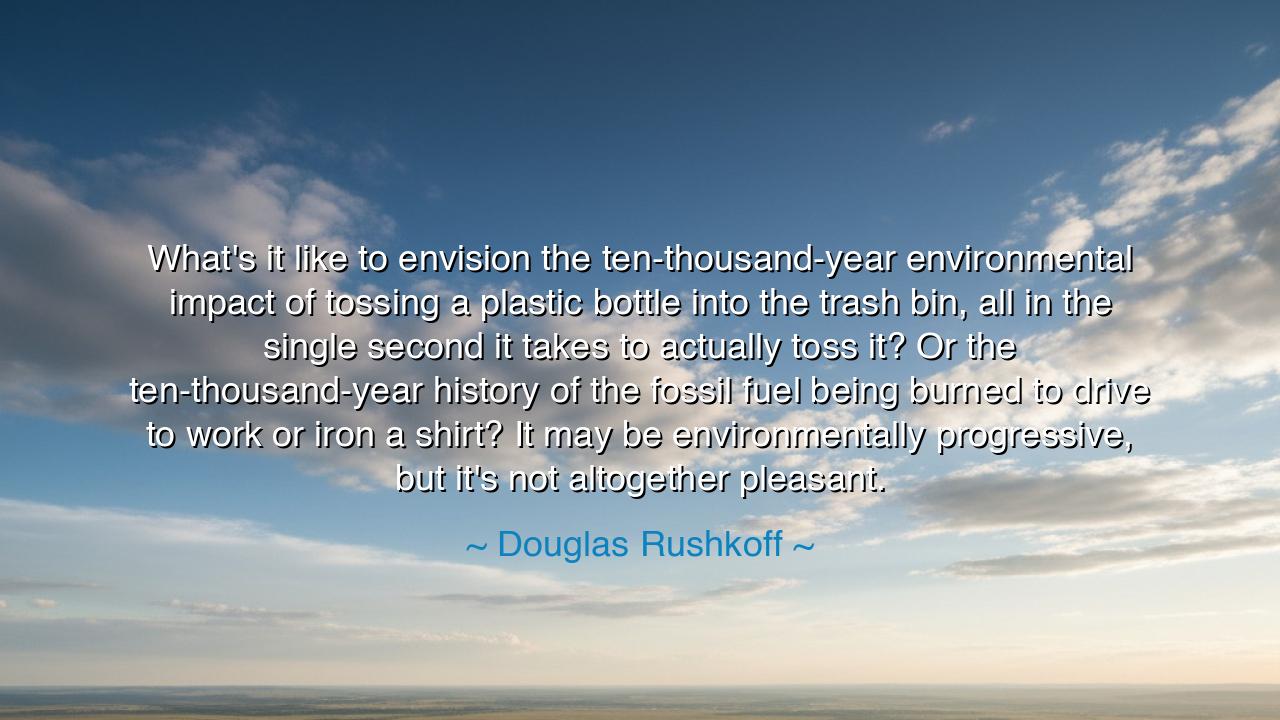
What's it like to envision the ten-thousand-year environmental
What's it like to envision the ten-thousand-year environmental impact of tossing a plastic bottle into the trash bin, all in the single second it takes to actually toss it? Or the ten-thousand-year history of the fossil fuel being burned to drive to work or iron a shirt? It may be environmentally progressive, but it's not altogether pleasant.






Hear, O seeker of truth, the voice of Douglas Rushkoff, who wrestled with the burdens of conscience and declared: “What’s it like to envision the ten-thousand-year environmental impact of tossing a plastic bottle into the trash bin, all in the single second it takes to actually toss it? Or the ten-thousand-year history of the fossil fuel being burned to drive to work or iron a shirt? It may be environmentally progressive, but it’s not altogether pleasant.” These words are not the speech of comfort, but of awakening. They are the cry of a man who feels the weight of eternity in the span of a moment, who sees the shadow of millennia cast by the smallest act.
The meaning of this saying lies in the tension between awareness and burden. Rushkoff reveals that to live with environmental consciousness is to awaken to the vast ripple of consequences set loose by each choice. The throwing of a plastic bottle, an act as fleeting as a breath, stretches across ages, for that bottle may remain long after nations fall and civilizations fade. The flicker of fuel burned in an engine is not merely a second’s convenience but the release of carbon formed in ancient seas, now loosed into the sky to shape the climate of the future. To see this is to walk with eyes open, but also with a heart heavy.
History gives testimony to this truth. Recall the story of Easter Island, where the people cut down their last trees centuries ago. Each tree felled seemed small in the moment, serving to build canoes or erect monuments. Yet the accumulation of those choices brought ruin—deforestation, famine, collapse. Did they imagine, as they swung the axe, that their act carried centuries of consequence? Likely not. But Rushkoff urges us to see what they could not: the long shadow of short actions.
So too in our own time, we remember the dawn of the plastic age. When it first appeared, plastic was hailed as miraculous—light, strong, and everlasting. Few paused to think what “everlasting” meant. Now our oceans are choked with bottles, our rivers with bags, our lands with fragments that will outlast empires. Each purchase seemed harmless, each discard trivial. But across decades, the weight became immense. Rushkoff’s vision is to see this weight in every act, not only in hindsight but in the very moment of choice.
Mark this well, O listener: to awaken to such awareness is both noble and sorrowful. Noble, because it calls us to act with foresight and wisdom. Sorrowful, because it robs us of innocence. The one who sees the ten-thousand-year impact cannot live lightly, cannot cast aside a bottle or waste a drop of fuel without feeling the tug of the ages. This is the burden of the environmentally awakened soul: to live in the present, yet haunted by the future.
Let this be the lesson: do not close your eyes for comfort, nor allow the heaviness of awareness to paralyze you. Instead, let it sharpen your resolve. If every act echoes through millennia, then let your acts be those that heal, not harm. Reuse rather than discard, conserve rather than consume, walk when you might drive, and plant when you might destroy. Each small step, multiplied across lives, becomes a legacy of life instead of ruin.
Therefore, O child of tomorrow, embrace the discomfort of Rushkoff’s vision. Feel the weight of the plastic bottle before you toss it. See the ancient history of the fossil fuel before you burn it. And let that vision shape your hands toward restraint, your heart toward stewardship. For the burden is heavy, yes—but from such burdens are born the wisdom and strength that will preserve the earth for generations yet unborn.
Thus, Douglas Rushkoff’s words remind us that to live with eyes wide open is not always pleasant, but it is always righteous. Better to bear the sorrow of awareness than the silence of ignorance. For only those who see the shadows of ten thousand years can plant seeds of light for the ages to come.






AAdministratorAdministrator
Welcome, honored guests. Please leave a comment, we will respond soon